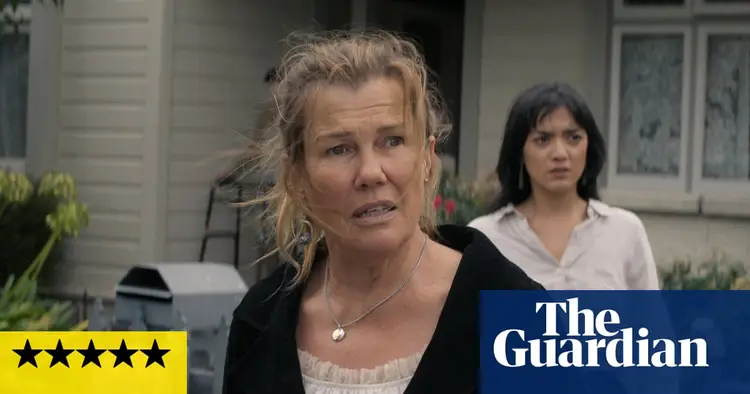After the Party review – hands down the best acting on TV all year

From the outset, Robyn Malcolm shines in her role as Penny Wilding, a middle-aged teacher who gives an unscripted talk to her students after one of them is caught viewing explicit content on his phone. Her approach is heartfelt, insightful, and straightforward, lacking any sugar-coating. Although her principal has shared certain guidelines for handling the situation, Penny believes that her direct method is faster and more impactful.
"After the Party" delves into the clash between an unstoppable force and an elusive, elusive target. Five years ago, Penny believed she witnessed her husband Phil (played by Peter Mullan) committing a sexual offense at his birthday celebration involving a drunken underage friend of their daughter, Grace (Tara Canton). In a fit of rage, she confronted him in front of their guests. The story unfolds through flashbacks from various perspectives over six episodes, revealing Phil's reaction, which oscillates between genuine indignation and the chilling facade of a seasoned predator. Mullan is expertly cast, bringing a sense of lurking threat beneath his seemingly ordinary demeanor.
The majority of the guests, and eventually, many residents of their small town in Wellington, New Zealand, doubt Penny's story. Some refuse to accept it, while others simply don’t want to believe her. The extent of denial that people can maintain, along with the struggle between bravery and cowardice—and how much resentment standing up for what's right can evoke—are key themes in this intense, thought-provoking drama.
Even though most of their friends and neighbors remained neutral or supportive, Phil couldn't handle the doubt and suspicion and decided to leave town. Now, he’s back as if nothing ever happened, and most people are welcoming him with open arms. On the other hand, Penny’s anger and sense of powerlessness lead her to make a series of rash choices. She takes on local fishermen who are illegally fishing in protected waters and even reaches out to Phil’s new school, where he coaches sports and organizes student trips, to alert them about the accusations against him. Her increasingly drastic actions push more people away, including Grace, who has always supported her father. As Penny becomes more isolated, she finds herself caring even less about the situation – and she didn't have much to begin with.
Much like shows such as Mare of Easttown or Happy Valley, After the Party centers around a middle-aged woman who has experienced enough of life to recognize how truly harsh it can be. The character is portrayed by a middle-aged actress who brings a sense of authenticity to her role. Malcolm’s performance may be the standout of the year, possibly even her career. The story paints a picture of a woman whose unwillingness to compromise or turn a blind eye to perceived threats and injustices is seen as both a personal shortcoming and a form of courage. After the Party poses the question of whether there are certain things one should never let go of or simply "move on" from, despite the encouragement to do so. Is Penny simply an obsessive individual deserving of pity, or is she a rational person battling against a world that often prefers to rationalize problematic behavior rather than confront it, thereby allowing potential offenders to escape scrutiny? Or has she perhaps made a real misjudgment that is actually harming an innocent man and her own family in her quest for resolution?
The debate about whether Phil is truly guilty or innocent often takes a backseat to examining how the accusations impact those around him. We witness Penny's relationships with her friends and family struggle and deteriorate; there's a particularly heart-wrenching moment at a funeral where Grace delivers a eulogy that serves as a reminder not of the deceased but of the brutal hurt children can inflict. Penny's home and work life fall apart, while the everyday inconveniences persist without pause—broken freezers, ruined lasagna, snapped bike chains, and rodents in the compost. Life's little problems don't vanish just because something huge and horrific has happened.
After the Party captures the intricate nuances of middle-aged life in much the same way that Mare and Happy Valley do, creating an engaging experience that's deeply authentic. Directed by Peter Salmon and primarily scripted by Dianne Taylor—alongside contributions from Sam Shore, Martha Hardy-Ward, and Emily Perkins—this production is masterfully realized. The supporting cast is consistently well-developed and skillfully portrayed. However, it’s Malcolm who stands out as the focal point. What a character! What an actor! What a remarkable performance!











































